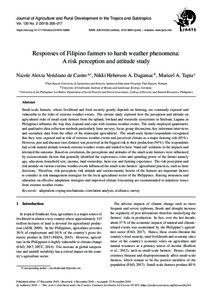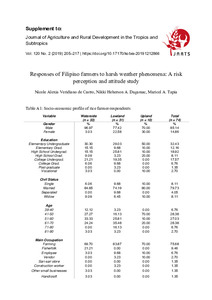| dc.date.accessioned | 2020-01-06T09:56:50Z | |
| dc.date.available | 2020-01-06T09:56:50Z | |
| dc.date.issued | 2019-12-17 | |
| dc.identifier | doi:10.17170/kobra-20191212866 | |
| dc.identifier.uri | http://hdl.handle.net/123456789/11408 | |
| dc.description | Gedruckte Ausg. im Verlag Kassel Univ. Press (www.upress.uni-kassel.de) erschienen. | ger |
| dc.language.iso | eng | eng |
| dc.rights | Urheberrechtlich geschützt | |
| dc.rights.uri | https://rightsstatements.org/page/InC/1.0/ | |
| dc.subject | adaptation | eng |
| dc.subject | coping mechanisms | eng |
| dc.subject | correlation analysis | eng |
| dc.subject | resilience | eng |
| dc.subject | survey | eng |
| dc.subject.ddc | 630 | |
| dc.title | Responses of Filipino farmers to harsh weather phenomena: A risk perception and attitude study | eng |
| dc.type | Aufsatz | |
| dcterms.abstract | Small-scale farmers, whose livelihood and food security greatly depends on farming, are constantly exposed and vulnerable to the risks of extreme weather events. The current study explored how the perception and attitude on agricultural risks of small-scale farmers from the upland, lowland and waterside ecosystems in Siniloan, Laguna in Philippines influence the way they respond and cope with extreme weather events. The study employed quantitative and qualitative data collection methods particularly farm surveys, focus group discussions, key informant interviews and secondary data from the office of the municipal agriculturist. The small-scale farmer-respondents recognised that they were exposed and at risk of extreme weather events and perceived climate as a major farming risk (85 %). However, pest and diseases (not climate) was perceived as the biggest risk to their production (94 %). The respondents had a risk-neutral attitude towards extreme weather events and tended to have ‘band-aid’ solutions to the impacts and tolerated the outcome. Based on correlation, the perceptions and attitudes of the small-scale farmers were influenced by socioeconomic factors that generally identified the experiences, roles and spending power of the farmer namely age, education, household size, income, land ownership, farm size and farming experience. The risk perception and risk attitude on various extreme weather events influenced the small-scale farmers’ agricultural practices, such as farm decisions. Therefore, risk perception, risk attitude and socioeconomic factors of the farmers are important factors to consider in risk management strategies for the local agricultural sector of the Philippines. Raising awareness and education on effective adaptation strategies and improved climate forecasting are recommended to minimize losses from extreme weather events. | eng |
| dcterms.accessRights | open access | |
| dcterms.creator | Castro, Nicole Alexia Veridiano de | |
| dcterms.creator | Dagamac, Nikki Heherson A. | |
| dcterms.creator | Tapia, Maricel A. | |
| dc.type.version | publishedVersion | |
| dcterms.source.identifier | ISSN 2363-6033 | |
| dcterms.source.issue | No. 2 | |
| dcterms.source.journal | Journal of Agriculture and Rural Development in the Tropics and Subtropics (JARTS) | eng |
| dcterms.source.pageinfo | 205-217 | |
| dcterms.source.volume | Vol. 120 | |


